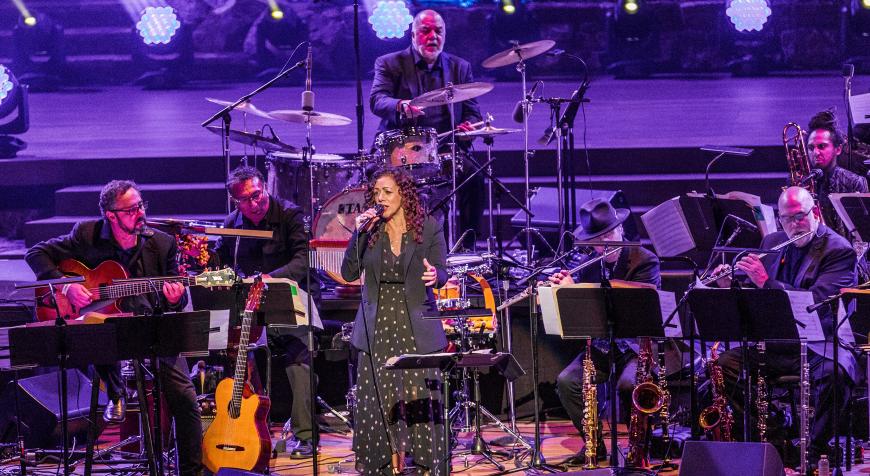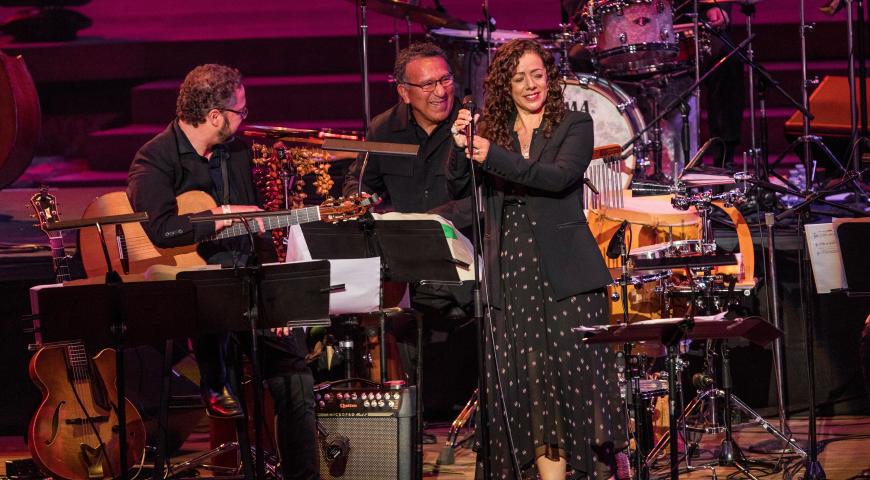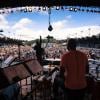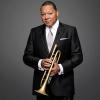
Now 15 years deep, the Angel City Jazz Festival is well established in its stated mission of adventurism, bringing challenging jazz to Los Angeles. By some measure, the festival — founded by Rocco Somazzi — serves as an antidote and alternative to the mainstream, party-minded agenda of the Hollywood Bowl Jazz Festival (formerly the Playboy Jazz Festival) each summer. As such, some poetic justice could be detected in the fact that this year’s Angel City Jazz Fest launched at the John Anson Ford Amphitheatre, a humbler yet also historic outdoor venue across the 101 freeway from the Bowl.
This year’s Angel City event opened in a grand and artistically powerful way on Friday with the fascinating Storytellers project, created by Brazilian-in-Los Angeles vocalist Luciana Souza and masterful arranger Vince Mendoza. A stellar big band of L.A.’s finest players provided a lush, propulsive, and sensitive ensemble tapestry, laid out in Mendoza’s smart charts. Included in the musician ranks was a Weather Report reunion between Peter Erskine and Alex Acuña on drums and percussion, making a subtle cross-reference to Mendoza’s own work transcribing and arranging music by that band’s late co-leader, Joe Zawinul.
Also on stage were longtime Souza ally and guitarist Larry Koonse, go-to West Coast saxophonist Bob Sheppard, the excellent tenor saxophonist Daniel Rotem, and Mendoza’s impressive pianist son, Luca. Luca turned a handsome, captivating solo on “Varanda” — co-written by another young sensation, Brazilian guitarist Chico Pinheiro.
Although Angel City’s general aesthetic focus has been on edgier and sometimes avant-garde corners of the jazz world, this festival opener had the broader appeal that Brazilian music naturally garners. But this was also more of a deep-diving, thinking person’s Brazilian evening, avoiding the hits of Antônio Carlos Jobim, for instance, in favor of his ambitious 1972 orchestral piece Matita Perê, beautifully retooled for big band by Mendoza and sung with Souza’s usual incisive, subtle poise.
Storytellers rises out of a fruitful partnership between two Los Angeles-based musicians of global importance: Souza is a distinctive, distinguished singer who easily crosses over genre borders, while Mendoza’s richly musical intelligence has brought fresh sounds and concepts to the big-band format and has included work with such European groups as the Dutch Metropole Orkest and the WDR Big Band. It was in 2017, while director of WDR, that Mendoza invited Souza as a guest soloist, planting the seeds of their Brazilian project and a 2020 album on Sunnyside.

Pandemic restrictions delayed the live presentation of the music, adding to the existing challenges of presenting an original big-band project (especially in the United States, which doesn’t lend the medium the government support it enjoys in Europe). In some way, the extended wait sweetened the arrival onstage, also helped by the added buzz of Angel City Jazz Festival-opening status.
The Ford proved an ideal venue for a cerebrally charged but innately organic night. The two-set concert cast light on music beyond standard-brand Brazilian repertoire, including iconoclast guitarist Guinga’s “Meu Pai,” Ivan Lins’s rippling “Se Acontecer,” and Gilberto Gil’s “Mar de Copacabana,” which had Souza injecting one of her occasional spidery unison lines with the band. The singer’s lyrical sensitivity with balladic material was beautifully showcased with “Beatriz,” elegantly clad in Mendoza’s arrangement. Brazilian musical history was in the offing again with this Chico Buarque/Edu Lobo tune released by Milton Nascimento in 1983.
After closing the official setlist with Lins’s bubbling groover, the energy level kicked up a notch or three with Mendoza’s own fiendishly charismatic “Choro No. 3.” Acuña’s colorful percussion solo led into a twisting fast unison line featuring the ever-game Souza and the instrumentalists, with a restlessly roaming harmonic map and sneaky ensemble lines interwoven between solos. Mendoza’s seductively pulsing and searching energy made for a tour-de-force exit strategy, capping off an altogether invigorating and satisfying evening.




